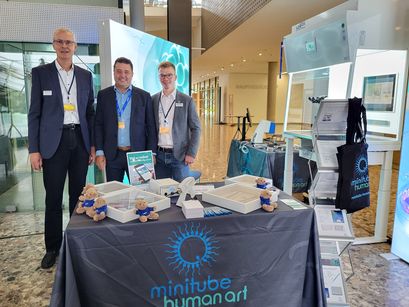Minitube Human ART makes a mark at DVR Congress
The recent DVR Congress (Dachverband Reproduktionsmedizin), a joint congress of all German associations in reproductive medicine, saw a significant presence from Minitube Human ART. The event took place at the iconic former Bundestag building in Bonn, now known as the "World Conference Center Bonn," and featured three lecture halls, with the largest one located in the former parliamentary chamber.
With a total of 28 exhibitors and approximately 450 attendees engaged in the congress program and exhibition area, the event created a unique platform for networking, knowledge exchange, and showcasing the latest advances in the field of reproductive medicine.
One of the standout moments of the congress was the evening event held at the GOP Varieté-Theater, featuring acrobatic performances between courses. It offered a blend of entertainment and the opportunity for participants to unwind and connect in a more relaxed setting.
Minitube Human ART attracted considerable attention at the congress, particularly due to our innovative MultiCoder technology, a semi-automated system for direct printing on lab items. We also unveiled a partnership with LABOX, comprising exclusive distributorship of most advanced laminar flow workbenches for IVF in Germany.
Paul Gassner and Sebastian Simmet, key representatives from Minitube Human ART, were actively engaged in numerous discussions, providing guidance to potential customers, and conducting live demonstrations of our cutting-edge products.
The DVR Congress concluded with the unveiling of the latest statistics from the German IVF Registry (Deutsches IVF-Register) in its 2022 edition. These statistics provide valuable insights into the field of assisted reproductive technology in Germany.
As of the latest data, a remarkable 388,716 children have been born in Germany after IVF treatment. The birth rates per embryo transfer in 2021 were 23.4% for fresh cycles and 21.3% for freeze-thaw cycles, demonstrating that frozen embryo transfers tend to be as successful as fresh ones.
In 2022, Germany witnessed a total of 67,043 female patients undergoing infertility treatments, with an average treatment count of 1.9 per woman. The average clinical pregnancy rate for fresh IVF cycles stood at 31.8% per embryo transfer, while for intracytoplasmic sperm injection (ICSI), it was slightly lower at 30.2%.
These statistics underscore the continued growth and significance of assisted reproductive technology in Germany, making the DVR Congress a crucial platform for industry leaders like Minitube Human ART to showcase their contributions and engage with professionals in the field.
With a total of 28 exhibitors and approximately 450 attendees engaged in the congress program and exhibition area, the event created a unique platform for networking, knowledge exchange, and showcasing the latest advances in the field of reproductive medicine.
One of the standout moments of the congress was the evening event held at the GOP Varieté-Theater, featuring acrobatic performances between courses. It offered a blend of entertainment and the opportunity for participants to unwind and connect in a more relaxed setting.
Minitube Human ART attracted considerable attention at the congress, particularly due to our innovative MultiCoder technology, a semi-automated system for direct printing on lab items. We also unveiled a partnership with LABOX, comprising exclusive distributorship of most advanced laminar flow workbenches for IVF in Germany.
Paul Gassner and Sebastian Simmet, key representatives from Minitube Human ART, were actively engaged in numerous discussions, providing guidance to potential customers, and conducting live demonstrations of our cutting-edge products.
The DVR Congress concluded with the unveiling of the latest statistics from the German IVF Registry (Deutsches IVF-Register) in its 2022 edition. These statistics provide valuable insights into the field of assisted reproductive technology in Germany.
As of the latest data, a remarkable 388,716 children have been born in Germany after IVF treatment. The birth rates per embryo transfer in 2021 were 23.4% for fresh cycles and 21.3% for freeze-thaw cycles, demonstrating that frozen embryo transfers tend to be as successful as fresh ones.
In 2022, Germany witnessed a total of 67,043 female patients undergoing infertility treatments, with an average treatment count of 1.9 per woman. The average clinical pregnancy rate for fresh IVF cycles stood at 31.8% per embryo transfer, while for intracytoplasmic sperm injection (ICSI), it was slightly lower at 30.2%.
These statistics underscore the continued growth and significance of assisted reproductive technology in Germany, making the DVR Congress a crucial platform for industry leaders like Minitube Human ART to showcase their contributions and engage with professionals in the field.


